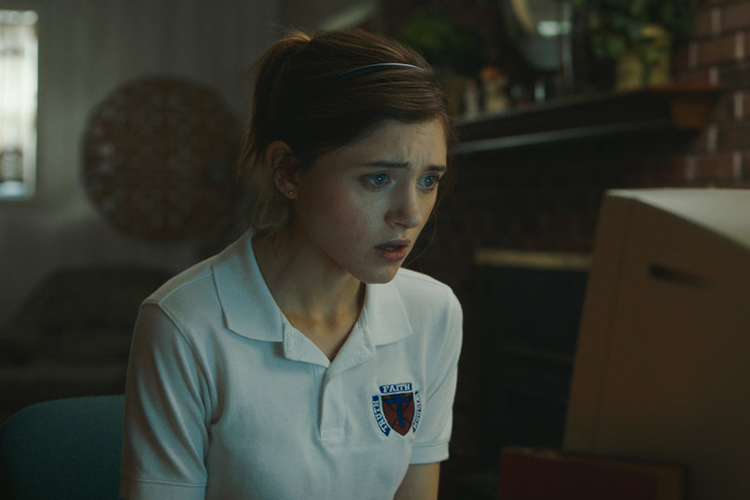If you’re wondering what Yes, God, Yes is about, ask yourself this: where in life could you see yourself screaming that phrase in complete ecstasy? If you’re imagining yourself in a worship service, hands held high to the heavens, you’re right. If you’re imagining yourself in bed, hands working till you’re in heaven, you’re also right—what common ground we’ve found here today!
Religion and masturbation have had a historically uneasy relationship, but that’s precisely the road that writer/director Karen Maine—in her directorial debut here—intends to go down on. She explores the dialectic between spiritual and bodily nirvana through Alice, an early-2000s Catholic teenager who’s just beginning to know herself in the biblical sense. After she stumbles upon her first sexual experience via AOL chat, Alice decides to attend a religious youth retreat, hoping that she’ll learn to honor the Lord with her lips instead of honoring her own—but when she finds temptation lurking in the backwoods, Alice fears that her holy intent will be taken for a ride.
Yes, God, Yes often feels like a directorial debut, and in a positive sense. Maine crafts portraits of sexual awakening so indelible that you can tell they’d been lurking in the back of her mind for years, waiting for the perfect canvas. A few of the most expressive images were lifted directly from Maine’s short film of the same name; seeing them retooled in a feature with a modicum more experience (and a slightly bigger budget) is practically transporting. The pleasure devil’s in the details. In Alice’s first masturbation scene, the camera fixates on particular minutiae in extreme close-up: Alice’s hand sliding down her skirt, trembling towards a new horizon; and just before that, her fingers shedding cheese puff dust on an old computer mouse. Alongside an unabashedly cutesy score, this juxtaposition of images soaks a supposedly shameful act in innocence—it’s the cinematic reclamation of a moment stolen by religious guilt. For viewers that can’t decouple their sexual adolescence from self-hatred, Yes, God, Yes offers a space for a more pure “first time”.
The film also flies in the face of the industry’s longstanding fear of female sexuality. In Kirby Dick’s seminal documentary This Film is Not Yet Rated, undercover investigators infiltrating the MPAA—the organization that assigns age ratings to movies—discovered that on-screen female pleasure would provoke the (homogenously religious) MPAA to give movies an NC-17 rating, whereas equivalent instances of male pleasure only earned an R. If only Dick could see how far things have come. Yes, God, Yes allows Alice to stare intently past the camera, eyes swelling with lust, body quivering with recognizable and indisputable intensity. The movie’s mere existence feels as rebellious as cunnilingus under a pulpit.
In a world unaccepting of rebellion, acts of resistance can be accompanied by the heaviness of dread, but Maine keeps the tone light throughout her film. This is well and good for distancing sexual feelings from shame, but it weakens many of the points being made about sexual shame. Thrusting too deep into the pit of religious guilt would distract from the movie’s persistent lightheartedness, so Yes, God, Yes keeps itself buoyed above the realities of its subject: in Alice’s world, inappropriate conversations with religious leaders are easily detected and avoided, fear of hell is something to be dispelled with a single conversation, and sexual mistruths bend young victims rather than break them. It’s not as if the movie has to plumb those hairy depths, but in the absence of doing so, it repeatedly stresses the mantra of “religious people are horny too!” as if it had stumbled upon a groundbreaking truth. By the film’s climax, it’s preaching this message with the naked sentimentality of your average Christian movie.
Natalia Dyer’s performance as Alice is just as overt, but that’s mostly a good thing, and it actually counteracts the film’s weightlessness. If the script is a little light on the actualities of shame, Natalia’s face is not. Whether she’s biting her lips with orgasmic anticipation or shouldering the burden of dogmatic puritanism, her expressions showcase that whatever she’s feeling, she’s feeling it hard. Church-sponsored misogyny and abstinence education land on her like a ton of bricks. Seeing Dyer’s face contorted by humiliation makes you thankful for the ease with which her character navigates that pain—Yes, God, Yes may not be a revelation, but it’s a vicarious respite.
★★★½ (3.5/5)




